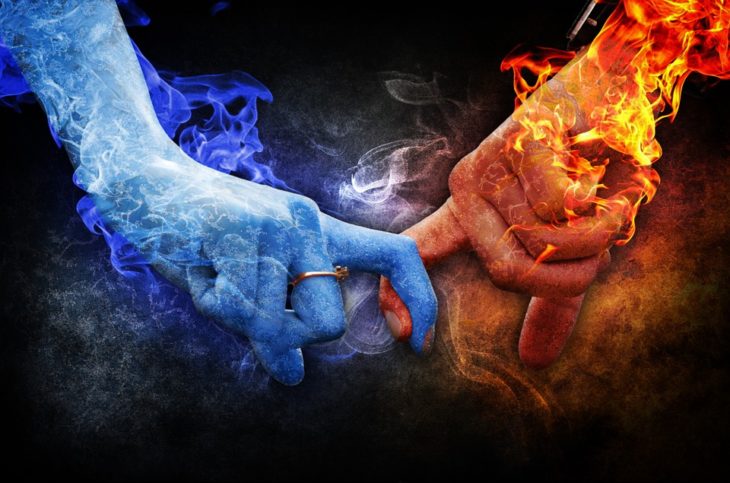Recently, I was having a Big Serious Relationship Talk with a woman I really respect. I know Dr. Debra Haffner in a professional-relationship-turned-friendship way for her work as executive director of the Religious Institute, which promotes a greater understanding of sexuality issues within religion. Debra is also an ordained Unitarian Universalist minister and, as such, she works with a lot of individuals and couples on answering “the big questions” of life. I’m not an especially religious person (“faithful,” might be a better description) and I’m not one to go around calling ministers when I have problems. But when I knew I needed to talk to someone wise and thoughtful, her image came to the forefront of my mind.
I am so glad we talked. I don’t read many self-help books or psychology books. Much like WebMD always making me think I have cancer, self-help books put “ideas” in my head. But there is something Rev. Debra explained to me that I found really enlightening: the concept of a “distancer” and a “pursuer” pattern in a relationship.

Source: Pixabay
A “distancer” and a “pursuer” are what their names implie. The “distancer” is the one who needs space and maybe puts a wall up to keep themselves cocooned, while the “pursuer” is the one who tries to move closer and enmesh. (And bear with me here, because I don’t have a psychology degree; I am merely repeating some of what we discussed and also what I have read online about the subject.) As you can imagine, these two types can get into a pattern of behavior where the “pursuer” pushes harder and so the “distancer” moves farther away.
For almost my entire life, I was the one who did all the chasing. I attribute 50 percent of the reason for that to some screwed-up issues regarding messages about love that I learned from my parents growing up, but the other 50 percent was me sincerely enjoying the chase. I have an aggressive streak and I like hunting? What can I say? Believe me, I have heard 682 times before from well-meaning friends and family members who advised me to be more traditionally “feminine” and let myself be chased. That’s just not … me. I was single a lot, dated around a ton, and had lots of fun experiences interspersed with a couple slightly serious relationships.
When I met Mr. Jessica, though, I was not my usual full-bodied-chaser self. In fact, I was highly, highly skeptical of all men. Only a month or two earlier, I had been badly burned by a guy who had said he would leave his girlfriend for me. (That’s another topic entirely that I have written about in a different post.) For a few months, I was at the point where I couldn’t trust what came out of any man’s mouth. So when I met Mr. Jessica and we exchanged text messages and then emails, I kept him at an emotional distance. I didn’t get too attached. For someone like me, that was probably a good thing. And it seemed to “work”—as in, work in my favor—because he started pursuing me hard. I mean, hard. I was the one who suggested we slow things down. I was never the one to suggest that before, but it honestly felt good to really be chased for once.

Source: Pixabay
I opened up. We fell in love with each other. Whatever initial dynamic existed where he was forced to chase me faded away. Two years in, there wasn’t any particular chase at all; the relationship just was. But when I started reading more about the “distancer” and “pursuer” pattern, it made me realize that the roles had materialized again—but they had flipped. This time it wasn’t about chasing or catching someone, though. This time it was about pursuing an intimacy we had already established and having the other person distance themselves from it. And as Rev. Debra explained to me, the more the “pursuer” pushes in hopes of grabbing the “distancer” and pulling them back, the further away the “distancer” will go to get the space they need. Mathematically speaking, it is a losing game to pursue someone who is being the “distancer.”
I am hoping that Mr. Jessica and I fall out of this pattern, or at least go back to the more innocent chase-or-be-chased feeling. She talked to me also about the concept of “self-soothing”—learning to take the bumps of the relationship (by yourself, by talking to friends or a counselor, etc.) instead of needing the “distancer” to salve all wounds. Asking someone who is lukewarm on intimacy to do something so intimate as soothe you is, well, not a good idea. Before Rev. Debra introduced that concept to me, I would have described myself as someone who can soothe herself. I’ve been through a lot of crap in life and I’m still standing, aren’t I? But I realize now that may have been a little bit of a disillusion. I do turn a lot to my friends, family, and yes, Mr. Jessica, to comfort me. And that’s fine, to a degree—but I can’t hinge my own ability to feel better on other people’s timeliness/willingness/what-have-you to do it.
As much as it sucks to need to have Big Serious Relationship Talks with people, it has also become an opportunity to work on myself and see things in a new light. It’s hard … all of it. But I’d be lying if I didn’t say parts of it weren’t rewarding, too.
Original by Jessica Wakeman
